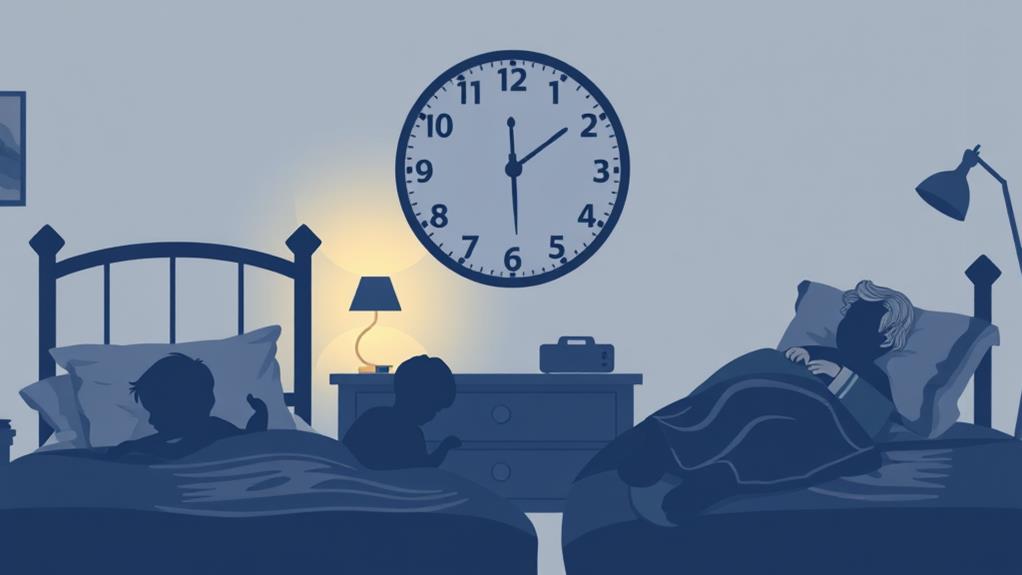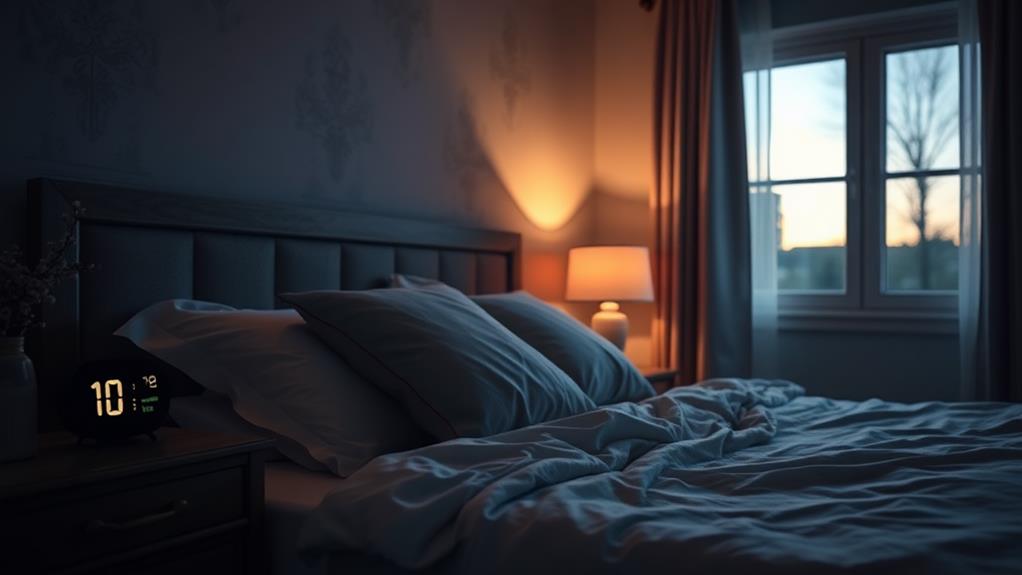When you think about the best time to sleep and wake up, consider how your age and daily routine play a role in this decision. You might find that aiming for 7 to 9 hours of sleep is essential for your overall well-being, but figuring out the ideal bedtime can be more nuanced. Have you ever wondered how your sleep patterns affect your energy and focus throughout the day? Understanding the intricacies of your sleep cycle could lead you to better choices, so let’s explore what might work best for you.
Key Takeaways
- Adults should aim for 7-9 hours of sleep, ideally going to bed between 10 PM and midnight for optimal rest.
- Teenagers need 8-10 hours of sleep, with recommended bedtimes between 10 PM and 11 PM for better performance.
- Consistent wake-up times enhance sleep quality and help regulate the body’s internal clock.
- Gradually adjust sleep schedules by 15-30 minutes to establish a natural rhythm without disruption.
- Creating a calming bedtime environment and avoiding screens before sleep can significantly improve sleep onset and quality.
Importance of Sleep Timing

Getting your sleep timing right is essential for your overall well-being. When you go to bed and wake up at the same time each day, your body learns to follow a natural rhythm. This rhythm helps you feel more energetic and focused during the day. It’s like setting a schedule for your body, so it knows when it’s time to rest and when it’s time to be active.
If you’re sleeping well, you’ll notice that you’re in a better mood and ready to tackle whatever comes your way. Plus, a good night’s sleep can help your brain remember things better, which is super helpful for school or other activities. You might even find it easier to make friends because you’ll feel more confident.
On the flip side, if your sleep timing is all over the place, you might feel tired and cranky. Your body really loves routine!
Factors Influencing Sleep Patterns
Understanding the factors influencing sleep patterns can greatly enhance your sleep quality. Several elements play a role in how well you sleep each night. One big factor is your daily routine. If you go to bed and wake up at the same time every day, your body learns to expect sleep, making it easier to fall asleep.
Another important factor is light exposure. Your body has a natural clock, called the circadian rhythm, which is influenced by light. Try to get some sunlight during the day and limit screen time before bed. This helps your brain know it’s time to wind down.
Stress and anxiety can also mess with your sleep. When you’re feeling worried, it’s tough to relax. Finding ways to calm your mind, like reading or meditating, can help you sleep better.
Ideal Sleep Duration

Finding the right balance in sleep duration is essential for your overall well-being. You’ll want to aim for about 7 to 9 hours of sleep each night. This amount helps you feel refreshed and ready to take on the day. If you’re younger, like a teenager, you might even need a bit more, around 8 to 10 hours.
When you sleep enough, your mind can focus better, and you feel happier. It’s like giving your body a special recharge! But if you get too little sleep, you might feel tired, grumpy, or have trouble concentrating. No one wants that!
To figure out how much sleep you need, pay attention to how you feel during the day. If you’re yawning a lot or finding it hard to stay awake in class, it might be time to adjust your bedtime.
Try going to bed a little earlier or sleeping in on weekends. Remember, it’s okay to experiment until you find what works best for you. Your sleep is important, so make it a priority, and you’ll see a big difference in how you feel each day!
Sleep Cycle Stages
During sleep, your body goes through several distinct stages, each playing an essential role in your overall health. You typically cycle through these stages multiple times during the night, and each one has its unique purpose.
First, there’s light sleep. This is when you drift off and can be easily awakened. Next, you enter deeper sleep, where your body begins to repair itself. This stage is super important for growth and recovery.
Then, you enter REM (Rapid Eye Movement) sleep, which is where most of your dreaming happens. It’s a vital time for your brain to process memories and learn new things.
As you sleep, your body moves through these stages about four to six times each night. This means that getting good quality sleep helps you feel refreshed and ready to tackle the day ahead.
To make the most of your sleep cycles, try to stick to a consistent bedtime and wake-up time. This way, your body can get used to its rhythm, making your sleep even more effective.
Best Times for Different Ages

Different age groups have varying sleep needs, and recognizing these differences can help you optimize your rest.
For toddlers, ages 1 to 3, getting around 12 to 14 hours of sleep is important. They usually go to bed between 7 and 8 PM, waking up around 7 to 8 AM.
As kids grow, those aged 4 to 12 need about 10 to 12 hours. A bedtime of 8 to 9 PM works well, so they wake up ready for school by 6 to 7 AM.
Teens, ages 13 to 18, have different needs. They should aim for about 8 to 10 hours of sleep. However, their natural sleep patterns shift, making them feel more awake late at night. A bedtime around 10 to 11 PM allows them to wake up by 6 to 8 AM, depending on their school schedule.
For adults, 7 to 9 hours is the ideal range. Going to bed between 10 PM and midnight helps you wake up refreshed by 6 to 8 AM.
Effects of Sleep Deprivation
When you don’t get enough sleep, your body and mind can really feel the difference.
Sleep deprivation can hurt your physical health, mess with your mood, and even make it tough to focus in school.
Let’s explore how missing out on those precious Z’s affects you and what you can do to feel better!
Physical Health Impact
Lacking adequate sleep can severely impact your physical health, leading to a range of serious issues. When you don’t get enough rest, your body struggles to function properly. You might notice you’re more tired, which can make everyday tasks feel tougher. This fatigue can lower your immune system, making it easier for you to catch colds and other illnesses.
Moreover, sleep deprivation can affect your heart health. You might be surprised to learn that not sleeping enough can raise your blood pressure and increase your risk of heart disease. It’s like skipping a battery charge; your heart needs that rest to stay strong and healthy.
You may also find that your weight can be affected. When you’re tired, your body craves unhealthy snacks for energy, which can lead to weight gain.
To keep your body in top shape, aim for 7 to 9 hours of sleep each night. Think of sleep as a superhero power, helping you fight off sickness and stay strong.
Mental Health Consequences
Sleep deprivation can greatly impair your mental health, leading to a cascade of emotional and cognitive challenges. When you don’t get enough sleep, you might feel more anxious or irritable. It’s like your brain’s on a roller coaster, bouncing around without control! You may find it hard to concentrate, making daily tasks feel overwhelming. This can lead to frustration, and nobody likes that feeling.
Additionally, lack of sleep can make you more sensitive to stress. You might notice that little things, which usually wouldn’t bother you, start to feel huge. This heightened stress can create a cycle where you struggle to relax, causing even more sleep problems. It’s a tough spot to be in!
But there’s good news! By prioritizing your sleep, you can boost your mood and mental health. Try setting a bedtime routine, like reading a book or doing some light stretching. Keeping a consistent sleep schedule helps your body know when it’s time to rest.
Cognitive Performance Decline
Cognitive performance takes a significant hit due to sleep deprivation. When you don’t get enough sleep, your brain struggles to focus and think clearly. You might find it hard to remember things or solve problems, which can be really frustrating. It’s like trying to run a race with a heavy backpack—you just can’t perform your best!
Studies show that a lack of sleep can lead to slower reaction times and poor decision-making. Imagine trying to play a video game but constantly missing the buttons. That’s what sleep deprivation does to your brain! You might also feel more easily distracted, making it tough to complete tasks.
But don’t worry! There are ways to boost your cognitive performance. Start by setting a regular sleep schedule. Going to bed and waking up at the same times every day helps your brain recharge. Aim for 7 to 9 hours of sleep each night.
You can also take short breaks during the day to refresh your mind. Remember, a well-rested brain is a powerful tool, ready to take on challenges and learn new things. So, prioritize your sleep, and you’ll see the difference in how you think and learn!
Morning Routines and Wake Times

Waking up refreshed can set the tone for your entire day, making it essential to establish a consistent morning routine.
Think about how great it feels to rise from bed, ready to tackle whatever comes your way! Start by picking a wake-up time that works for you, one that allows you to get enough sleep each night. This helps your body know when it’s time to rise.
Once you’ve settled on a time, create a simple routine. You might want to stretch for a few minutes, drink a glass of water, or enjoy a healthy breakfast. These small actions can wake up your mind and body, making you feel energized!
You could also set aside a few moments for something you love, like reading a book or listening to your favorite music.
Don’t forget to limit screen time first thing in the morning. Instead, focus on activities that boost your mood and prepare you for the day ahead.
Importance of Consistency
Establishing a consistent sleep schedule can greatly improve your overall well-being. When you go to bed and wake up at the same time every day, your body learns to expect sleep, which helps regulate your internal clock. This means you’ll feel more rested and energized during the day.
Imagine waking up each morning feeling refreshed instead of groggy! By sticking to a routine, you can enjoy better focus, mood, and even health. Consistency helps your brain and body know when it’s time to wind down and when it’s time to be alert.
You might think it’s okay to sleep in on weekends, but that can throw off your rhythm. Instead, try to keep your sleep times similar, even on days off. This way, you won’t feel like you’re starting all over again each week.
Your body loves routine! When you make a habit of going to bed and waking up at the same time, you’ll likely fall asleep faster and enjoy deeper sleep.
Tips for Better Sleep Hygiene

To boost your sleep hygiene, consider making a few key changes to your nightly routine.
First, create a calming bedtime environment. Dim the lights and keep your room cool and quiet. Maybe add a comfortable blanket or some cozy pillows to make your space inviting.
Next, try to stick to a relaxing pre-sleep ritual. You could read a fun book, listen to soothing music, or even practice deep breathing. It’s important to avoid screens like phones or tablets, as the blue light from these devices can make it harder to fall asleep.
Another helpful tip is to limit caffeine and heavy meals in the evening. Instead, enjoy a light snack if you’re a bit hungry. Herbal tea can also be a great choice to help you wind down.
Lastly, keep your sleep area tidy. A clean space can help your mind relax when it’s time to sleep.
Adjusting Your Sleep Schedule
Adjusting your sleep schedule can really make a difference in how you feel each day!
It’s important to be consistent with your sleep times, so your body knows when it’s time to rest.
You can start making gradual adjustments to your bedtime or wake-up time, little by little, to help your body adapt more easily.
Importance of Consistency
While shifting your sleep schedule might seem challenging, consistency is key to reaping the benefits of a good night’s rest. Sticking to a regular bedtime and wake-up time helps your body establish a natural rhythm. When you go to bed and wake up at the same times every day, you train your internal clock, making it easier to fall asleep and wake up feeling refreshed.
Imagine waking up without that groggy feeling! By being consistent, you’ll find that you can fall asleep faster and enjoy deeper sleep. This allows your body to repair and recharge, so you can tackle your day with energy. It’s like giving your body a gift every night!
If you have a busy schedule, try to carve out time for a consistent sleep routine. Even on weekends, try not to stray too far from your usual times. That way, you won’t disrupt your sleep cycle, and you’ll feel better overall.
Gradual Adjustments Techniques
Making changes to your sleep schedule doesn’t have to be overwhelming. Start by adjusting your bedtime and wake-up time gradually, say 15 to 30 minutes earlier or later, depending on your goal. This small change makes it easier for your body to adapt without feeling too tired or groggy.
Next, stick to your new schedule, even on weekends. Consistency is key! If you sleep in on the weekends, it can throw off your progress. Instead, try to wake up at the same time every day.
You can also create a bedtime routine that helps signal your brain it’s time to wind down. This might include reading a book, listening to calming music, or practicing some gentle stretches.
Avoid screens before bed, as the blue light can trick your brain into thinking it’s still daytime.






